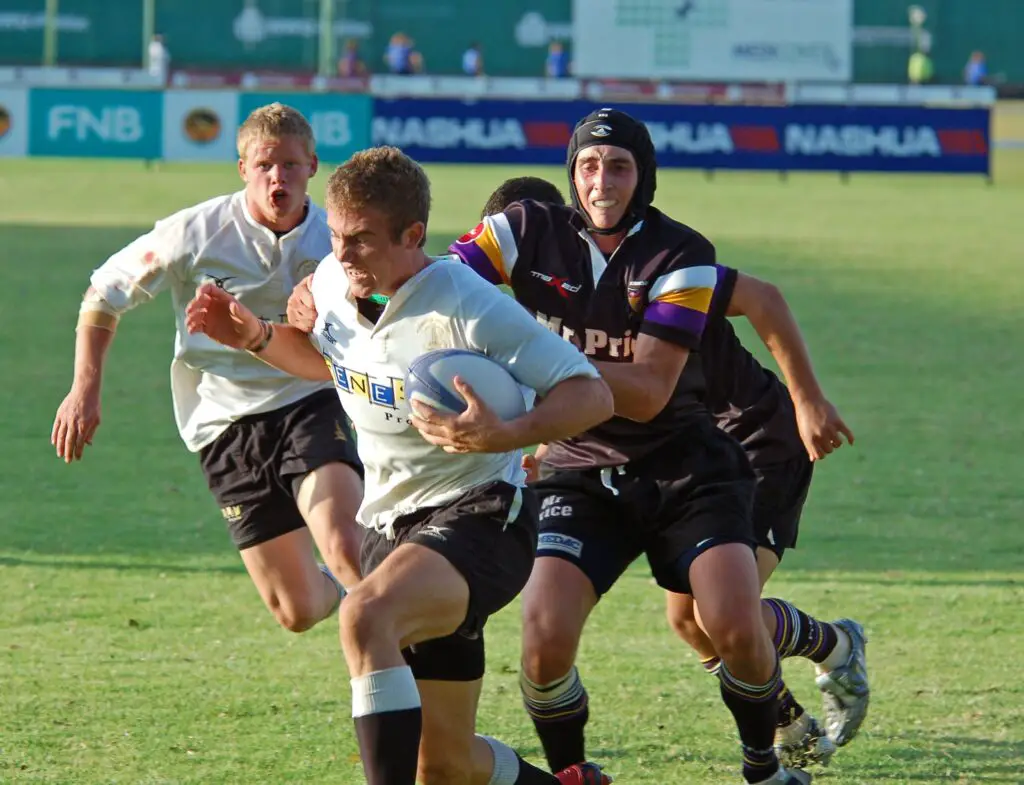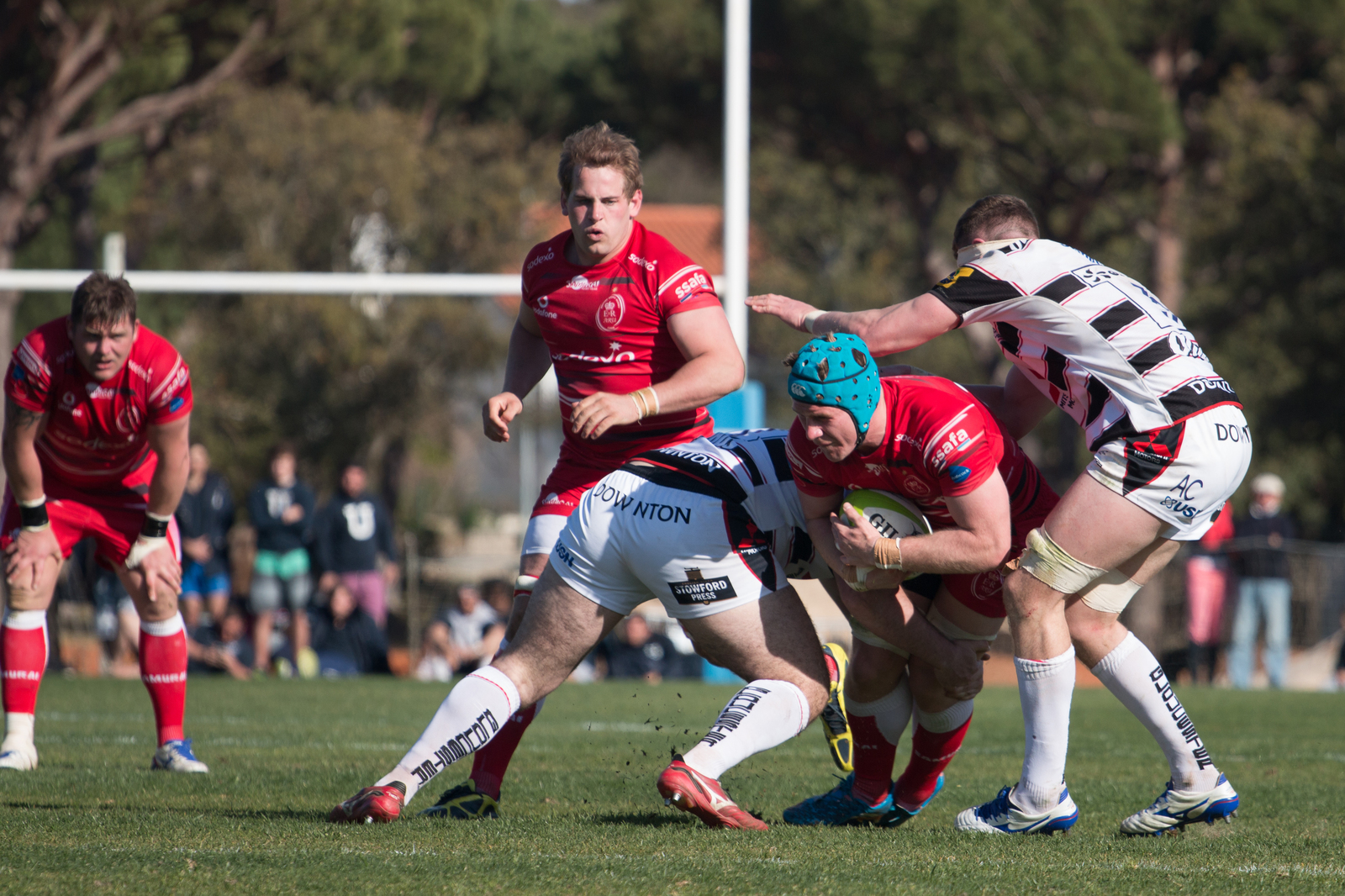Rugby players don’t wear helmets because it is against the traditional rules and spirit of the sport. Rugby is known for its physicality, and the emphasis on player safety is instead placed on proper technique, body positioning, and tackling skills.
The absence of helmets intentionally promotes a different style of play, where players are more cautious and rely on their agility and skills to avoid injury. Unlike American football, rugby focuses on evasive movements and tackles that are more controlled and less reliant on high-speed collisions.
This approach encourages players to be more aware of their body positioning and avoid reckless hits. A helmet could inadvertently lead to a false sense of security, potentially resulting in even more severe injuries due to more aggressive tackling techniques. Additionally, the absence of helmets fosters a sense of camaraderie and unity among players, as everyone shares a similar level of vulnerability on the field.
Why Don’t Rugby Players Wear Helmets?
Rugby players typically don’t wear helmets for several reasons:
- Tradition and Spirit: Helmets are not part of rugby’s tradition. The sport is known for its physicality, and the focus on player safety is instead placed on proper technique, body positioning, and tackling skills.
- Promotion of Skillful Play: The absence of helmets promotes a different style of play that relies on agility and skills rather than brute force. It encourages players to use evasive movements and make controlled tackles, reducing the reliance on high-speed collisions.
- Awareness and Caution: Without helmets, players are more aware of their body positioning and tend to avoid reckless hits. A helmet could lead to a false sense of security, encouraging more aggressive tactics that could result in severe injuries.
- Camaraderie: The shared vulnerability on the field due to the absence of helmets strengthens the unity among players. Everyone on the field shares the same risks, enhancing the team spirit.
Why Rugby Players Put Their Safety First
Rugby players prioritize safety, which is why they don’t wear helmets. Safety is crucial in contact sports, where injuries can occur. Over time, sports have evolved, including the development of protective gear. However, helmets aren’t commonly used in rugby due to the risk of potential harm.
Tackles, collisions, and scrums primarily cause these injuries
Instead, players rely on understanding and adhering to the rules to minimize damages. Rugby values the physicality and skill involved, and wearing helmets would alter the nature of the game by introducing additional protective measures. Despite the absence of helmets, rugby players prioritize their safety through proper training, technique, and fair play.
The game continues to thrive without helmets, emphasizing the importance of player responsibility and the spirit of the sport.
The Debate Around Rugby Helmets
Rugby is a unique sport that sets itself apart from others, and one of the key characteristics is the absence of helmets. Contrary to popular belief, rugby players do not wear helmets on the field. This misconception stems from the assumption that helmets are necessary to protect players from injuries.
However, in reality, the essence of rugby lies in its physicality and the emphasis on technique and skill rather than relying on protective gear. While other sports like American football or ice hockey incorporate helmets as part of their safety measures, rugby players embrace the risk and physicality of the game.
The absence of helmets allows for better field visibility, communication, and mobility. Additionally, players are taught proper tackling techniques and skilled in evading and absorbing tackles. Rugby is a sport that embraces the raw and physical nature of the game, making helmets unnecessary.
The Science Behind Rugby Head Injuries
Rugby players opt not to wear helmets due to the nature of the sport. Head injuries are common in rugby, ranging from concussions to skull fractures. Tackles, collisions, and scrums primarily cause these injuries. Helmets might offer protection, but they cannot wholly prevent head injuries.
Some argue that helmets may increase risk-taking behavior due to a false sense of security. The focus should be on improving training techniques, enforcing strict rules, and promoting player safety through proper technique and awareness.
Helmets alone cannot eliminate head injuries in rugby; a comprehensive approach is necessary to mitigate the risks of this physical and intense sport.
The Role Of Tackling Techniques In Rugby Safety
Rugby players opt not to wear helmets as the sport emphasizes skill and proper tackling techniques. The emphasis lies on minimizing head injuries through effective tackling rather than relying solely on protective gear. Players can significantly reduce the risk of head injuries by employing these techniques.
It is about maintaining control, body positioning, and technique during tackles. The rugby community believes skill and technique are paramount in ensuring player safety. Rather than depending on helmets for protection, players are encouraged to develop their tackling skills and be mindful of the risks associated with the sport.
This approach promotes player safety while maintaining the integrity of the game.

The Evolution Of Rugby Headgear
Over the years, the evolution of rugby headgear has primarily involved using skullcaps and scrum caps. These protective pieces have a long history in the sport, dating back to the early days when players utilized simple leather skullcaps.
As the game progressed, innovations created modern scrum caps that offer improved protection and comfort. Advancements in technology have contributed significantly to developing more effective headgear options. Despite these advancements, wearing headgear remains a personal choice for players, as the sport embraces the physicality and ruggedness it is renowned for.
By not wearing helmets, rugby players maintain the authenticity and essence of the game while prioritizing player safety through other protective gear.
The Impact Of Helmet Use On Rugby Culture
Rugby players have long resisted wearing helmets due to the influence of tradition and culture within the sport. Many players view helmet use as a deviation from the essence of rugby, where toughness and physicality are celebrated. Additionally, they argue that helmets can hinder peripheral vision and communication on the field.
Another reason for the resistance lies in the belief that helmet use may lead to a more reckless style of play, as players may feel a false sense of security. Furthermore, introducing helmets could result in a shift towards a more American or gridiron style of play, which goes against rugby’s distinctive identity.
Ultimately, the decision to wear helmets boils down to balancing player safety and preserving the essence of the game.
Lessons From Other Contact Sports
Rugby players choosing not to wear helmets present an opportunity to learn from other contact sports. Comparisons with American football and rugby league highlight the nuances in their safety precautions. Each sport has its own approach to protecting players during intense physical activities.
Exploring these differences can explain why rugby players choose not to wear helmets. It may be due to the nature of the game, where players rely on tackling techniques and proper form instead of additional protective gear. Additionally, the risk of head injuries may not be as high as in other sports.
Understanding these factors is essential for appreciating the decisions made by rugby players and the lessons we can draw from them.
Educating Players And Coaches On Safety Measures
Rugby players refrain from wearing helmets due to the sport’s inherent emphasis on safety education and training. The focus lies in equipping the players and coaches with a deep understanding of preventive measures and regulations. By implementing strict guidelines, rugby authorities aim to protect players from potential head injuries.
The absence of helmets encourages players to develop specialized techniques and strategies. The sport fosters a culture of skillful tackling and effective position play, reducing the need for headgear. These safety measures prioritize teaching players how to correctly tackle, position themselves, and understand the game’s physical demands.
The emphasis on education and training cultivates a safer rugby environment where players are educated to minimize risks associated with head injuries.
The Future Of Rugby Safety
Ongoing research and innovation are crucial in balancing tradition and player protection. It’s important to consider how to safeguard athletes without compromising the essence of the game.
The future of rugby safety lies in finding solutions that mitigate the risk of head injuries while preserving the physicality and spirit of the sport. Researchers and experts are continuously exploring advancements in technology and gear to enhance player safety on the field.
By focusing on innovative approaches and understanding the specific needs of rugby players, we can ensure that the sport continues to evolve for the benefit of everyone involved.
Frequently Asked Questions
Why Do Some Rugby Players Not Wear Helmets?
Some rugby players choose not to protect their heads with helmets. The reasons behind this decision vary. Some believe helmets provide a false sense of security, making players more reckless. Others argue that helmets could cause more harm than good during tackles, as they could increase the impact and force players’ necks into uncomfortable positions.
Why Can’t You Wear Shoulder Pads or Helmets in Rugby?
In rugby, you won’t see players rocking shoulder pads or helmets. It’s not the norm in this sport. Using these protective gears might change the game, pushing players to be more aggressive because they feel safer. Plus, they could restrict movement and make things less comfy on the field. Rugby focuses more on teaching proper tackling techniques and player awareness to prevent injuries rather than relying on protective equipment.
Conclusion
The absence of helmets in rugby is mainly due to the sport’s ethos and the nature of the game itself. While helmets protect other contact sports, rugby focuses on skill, technique, and fair play. Players are trained from a young age to tackle correctly and engage in safe play, reducing the need for additional head protection.
Additionally, helmets could increase the risk of injury due to the false sense of security they provide, leading to more aggressive and dangerous play. Rugby’s commitment to maintaining the spirit and traditions of the game, prioritizing skill and integrity over excessive protection, has contributed to its enduring appeal and rich history.
As rugby continues to evolve and adapt to the modern world, player safety remains a top priority without compromising the essence of the sport.




